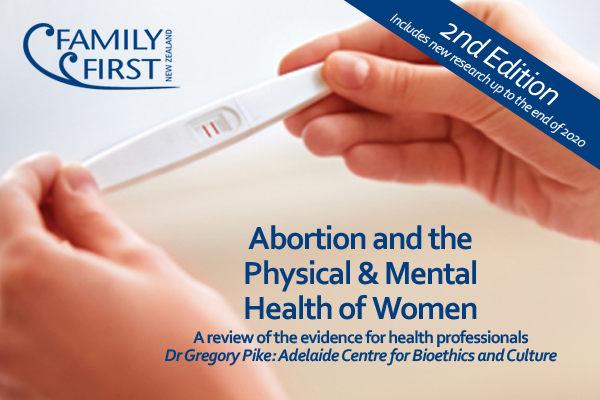Research Report Summarises Risks of Abortion To Women
 A new research paper released by Family First NZ for health professionals which reviews international evidence up to 2020 about the relationship between abortion and the physical and mental health of women says that abortion is associated with a wide range of adverse physical and psychological outcomes, and it is essential that women are made fully aware of all the risks.
A new research paper released by Family First NZ for health professionals which reviews international evidence up to 2020 about the relationship between abortion and the physical and mental health of women says that abortion is associated with a wide range of adverse physical and psychological outcomes, and it is essential that women are made fully aware of all the risks.
“Abortion and the Physical and Mental Health of Women – A review of the evidence for health professionals” is written by bioethicist Dr Gregory Pike, and updates an earlier 2018 report. It summarises the considerable international research undertaken on the physical and psychological impact on women, and also on the circumstances surrounding the decision-making process. It concludes that while studies on abortion have sometimes yielded inconsistent results, there is a clear correlation between abortion and adverse psychological outcomes.
Dr Pike says “Informed consent is one of the cornerstones of modern medical practice, expressed in numerous national and international codes of ethics, including that of the New Zealand Medical Association. It is just as applicable in relation to evidence about the effect of abortion on women as to any other procedure, and perhaps even more so because of the complex social, legal and ethical aspects of abortion. The updated material adds to concerns about women’s health in relation to the impact of abortion on overall mortality, preterm births, breast cancer, and adverse mental health outcomes. A new section on infertility and abortion has been added.”
Some of the conclusions based on the research analysis include:
- Intimate partner violence (IPV) is strongly correlated with abortion, with some research showing a 6-fold increase of IPV in women undergoing abortion compared to those in antenatal care. Abortion has also been linked to international trafficking and slavery of women.
- Globally, medical abortions are rapidly overtaking surgical ones. The process of medical abortion can be traumatic, with high rates of nausea, vomiting, diarrhoea, pain, fever, chills, headache, dizziness, and weakness. At least 5% of medical abortions require surgical intervention, and other complications include infection and heavy bleeding requiring transfusion. The overall incidence of complications after medical abortion is four times that after surgical abortion.
- Abortion increases the risk of premature delivery in subsequent pregnancies, either by infection or cervical damage from instrumentation.
- Significant inconsistencies exist in research about a possible causative link between abortion and breast cancer. However, it is well established that carrying a pregnancy to term is associated with lower breast cancer risk compared with abortion.
- The relationship between abortion and infertility is unsettled, primarily because of limited research, and yet there are reasonable explanatory pathways for a link, as well as evidence that in fact abortion does negatively impact fertility.
Dr Pike says that abortion is associated with a wide range of adverse physical and psychological outcomes, and it is essential that women are made fully aware of all the risks. Presentation for abortion also presents an opportunity to address the risk of coercion and intimate partner violence.
[In a poll of NZ’ers in 2011, the majority of New Zealanders (64%) said that women considering abortion have the right to be fully informed of the medical risks of abortion – and the alternatives. And a 2016 survey asked respondents whether they agreed with the following statement: “Women who have abortions risk harming their mental health as a result of the abortion.” Overall, 46% agreed with the statement, 21% were unsure or didn’t say, and only 33% disagreed. Significantly, strongest agreement with the statement came from the younger 18-40 age bracket (50%).]






